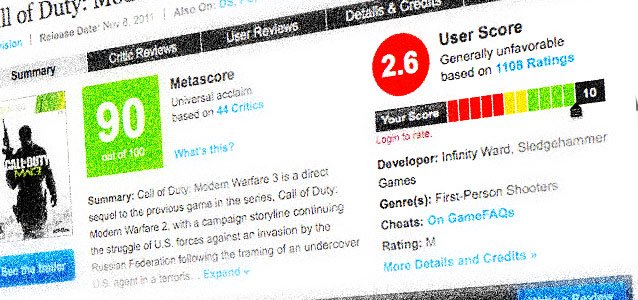


What’s in a score? The debate has been run over and over again and not just since recently.
Are game reviews product infomercials, product reviews, or critiques? Or a mixture of the three? And how do scores figure into it? As recent controversies have shown, videogame fans can be quite vocal—to indulge in understatement—when it comes to scoring. Jim Sterling of Destructoid can tell a story or two about the conundrum.
Score a game too low and the rabid fanboys come creeping out of the woodwork, screaming bloody murder, accusing the reviewer of shooting for page views by slapping what’s seen as too low a score on the game. Score a game too high and the reviewer is accused of being a corporate sellout. And that doesn’t even take into consideration the major economic implications of the practice of game scoring.
It seems that it’s becoming more and more common practice among the publishers to “punish” reviewers for low scores by denying them early access to review builds, whereby it seems that a higher Metacritic ranking in the first few days or weeks in the release window is guaranteed. The UK based Eurogamer recently let a number of developers speak on supposedly controversial scores. It seems review scores are becoming more and more important.
There’s yet another disturbing trend at hand, which can only be described as score inflation. The range of scores given out seems to be ever shrinking, public perception changing, narrowing on a monthly basis. Not too long ago it seemed like the consensus on scoring was that anything below a 7/10 was basically a bad game, not worthy of consideration. The 7-8 were competent but not all too outstanding, 9 was quite the achievement for the art form with 10s reserved only for the best of the best.
With this holiday deluge however this spectrum has narrowed down again, at least when taking the current “controversies” into consideration. Eurogamer received seemingly unprecedented amount of flak for awarding Naughty Dog’s Uncharted 3 with an 8, a score they also gave to the recent installment of the Call of Duty series. Cue rabid fanboy rage in the comment sections. Of course those vocal fanboys are not even the target audience for a review like that. Those are the people who had the games in question on preorder since the day they were listed on Amazon (or wherever).
It needs repeating that it is not the critic’s fault for stating his or her honest opinion on the subject at hand. With the current controversies, it might seem ever more rational to just abandon game scores all together, no matter how handy a review score might seem, especially since Metacritic has it’s own mechanisms to calculate a score out of a score-less review anyway. Also review scores really aren’t that easily comparable—a cross publication code for game scoring doesn’t exist. Also, a 10 given to a free-to-play iOS game doesn’t really compare too well to a 10 given to the latest AAA console title. One publication’s critic might attach an 8 to his critique whereas the same title with a different publication where the writer had very similar issues might still get the 9 publishers and fanboys are after, simply because different publications utilize the range of scores differently.
There is no easy answer to this problem, and gamers across the board will see a lot more of controversies like those recent ones before one can be found, that much remains sure.




 The Witcher 3: Wild Hunt All Witcher Gear Sets Location Guide: Serpentine, Griffin, Feline and Ursine
The Witcher 3: Wild Hunt All Witcher Gear Sets Location Guide: Serpentine, Griffin, Feline and Ursine Fight Night Champion Walkthrough
Fight Night Champion Walkthrough Brink: Failure or Death
Brink: Failure or Death Resident Evil Revelations 2 achievements, cheats
Resident Evil Revelations 2 achievements, cheats How to Fix Titanfall Crashes, Graphic Problems and More
How to Fix Titanfall Crashes, Graphic Problems and More